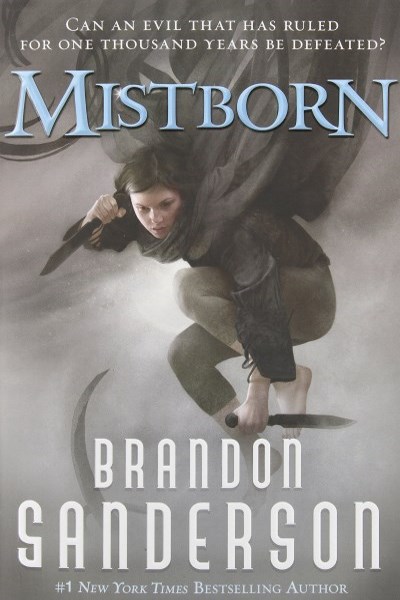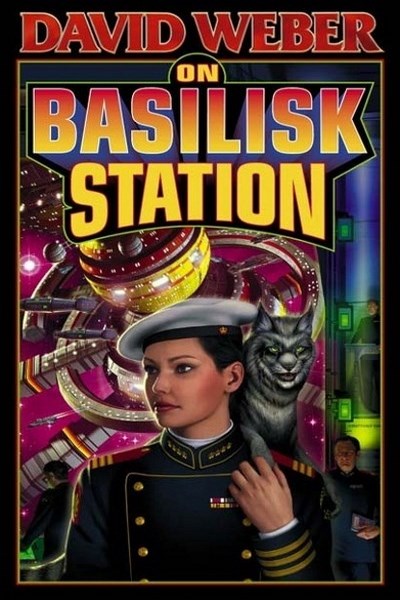Mistborn by Brandon Sanderson
Rating

Review
Mistborn by Brandon Sanderson
is the first novel in the NY Times bestselling Mistborn
trilogy. It is followed by The Well of Ascension
and The Hero of Ages
. Recently, Sanderson announced that film rights to the series have been optioned to Paloppa Pictures LLC.
Sanderson's debut novel, the sixth he'd written but the first to gain a publisher, was Elantris, which received enough critical acclaim to land Sanderson a three book deal from Tor to write the Mistborn books. Sanderson records the Writing Excuses podcast along with authors Howard Tayler and Dan Wells. Last, I would be remiss in not mentioning that Sanderson was chosen to complete the late Robert Jordan's
celebrated Wheel of Time
fantasy series by Jordan's estate. That book is The Gathering Storm
.
Mistborn is an ambitiously plotted novel. For time immemorial, the Lord Ruler has held dominion over the empire. Hailed as the "Hero of Ages", he confronted and defeated a dark, ancient force threatening the world long ago, thereby saving humanity from destruction. But something changed in the man following that confrontation: he became immortal and, in doing so, seemingly gave up his humanity. Now, he rules the world as a tyrant. The Final Empire is vast and all-powerful, but it lives under a pallor of perpetual gloom. Ashfalls (presumably from neighboring volcanoes) are a constant and, nightly, mists rise up to embrace the darkness.
Society in the Final Empire is dictated by a class system. At the top are the nobility. Beneath them are the skaa, or slaves. There is nothing in-between. Nobles can treat skaa however they like, including visiting upon them violence, rape, or any other depravity, all without any repercussion. It is a society more than ready for revolution.
Enter Kelsier, once a skaa sent to the Lord Ruler's mines to be worked to death. Right from the beginning we learn that not only did Kelsier survive that ordeal, but that he emerged possessed of allomantic abilities. In short, an allomancer is a sort of sorcerer who "burns" metal to gain certain powers, including vitality, the ability to fly, and even to see a short way into the future. The Lord Ruler has his own allomancers: obligators, who are a sort of priest, and Steel Inquisitors, indestructible arch-allomancers; very powerful and very deadly.
Kelsier returns to the empire's capital city for revenge. More than that, he begins to orchestrate the very downfall of the Lord Ruler and the Final Empire itself by fomenting dissent amongst the noble houses, raising a skaa army, and, finally, ending the Lord Ruler's reign by taking his life.
Amidst Kelsier's grandiose designs he finds Vin, a street skaa who also happens to be a Mistborn, a very special sort of allomancer. Kelsier and Vin form a sort of father/daughter relationship as they both work towards Kelsier's end goal. Much of Mistborn is told from Vin's perspective as she matures from ignorant, fearful street thief to something approaching a noblewoman. All the while she learns allomancy from Kelsier; right from the start she proves a capable pupil, even more powerful than Kelsier.
Sanderson weaves a fairly complex tapestry here; just when you think you've figured something out, you find out you were wrong. Sanderson excels at this, leading the reader down a fairly predictable road only to throw a curveball that changes everything. It keeps the story fresh and the tempo high. To be honest, there are parts of The Final Empire that are just plain exhausting.
The story flows well, though I did find some parts dragged slightly. There is what I found to be quite a ridiculous scene where Kelsier and his band of rebels are "white-boarding" their plans to take down the Final Empire. I don't know if Sanderson has ever worked in an office environment (I did some checking: No, he never has), but somehow the idea of rebels from a fantasy world outlining their plans to defeat an ancient evil using a chalk board was just kind of ridiculous. Fortunately, it's a short scene.
There is much carnage in this novel, though it is told in a matter-of-fact way and never really had me genuinely horrified. The obligators, Steel Inquisitors, and Mistborn are all very interesting, and the magic system is both unique and fun to read about as Sanderson's characters work within it's limits.
Last, the final battle between Kelsier and one of the Steel Inquisitors is spectacular and the novel's ending, much like many other parts of the book, was not entirely what I expected. That ending, however, is beleaguered by a sort of trial-and-error approach to defeating the Lord Ruler. Perhaps Sanderson meant to end it this way by deviating from another trope where our hero has discovered the means leaving only the execution or perhaps we are witnessing a writer grasping for a way to end a novel. Not entirely sure.
Mistborn is a long read (541 pages), though at times I had a hard time putting it down as I breezed through chapter after chapter. While the story told in this novel does come to a conclusion, there are definitely matters left unresolved and more than a few things I foresee Sanderson tackling in the subsequent novels in the series.







Leave a Comment